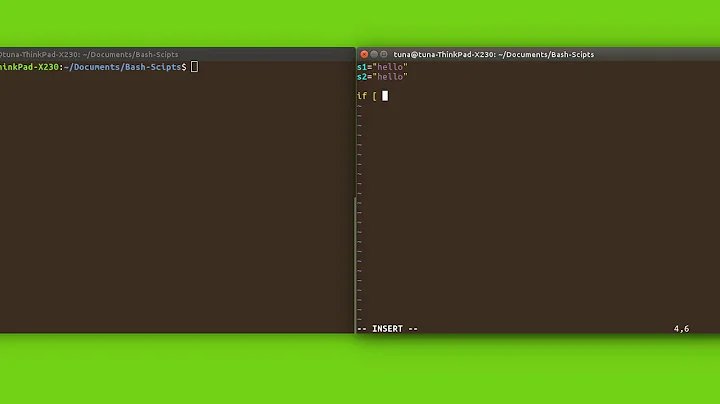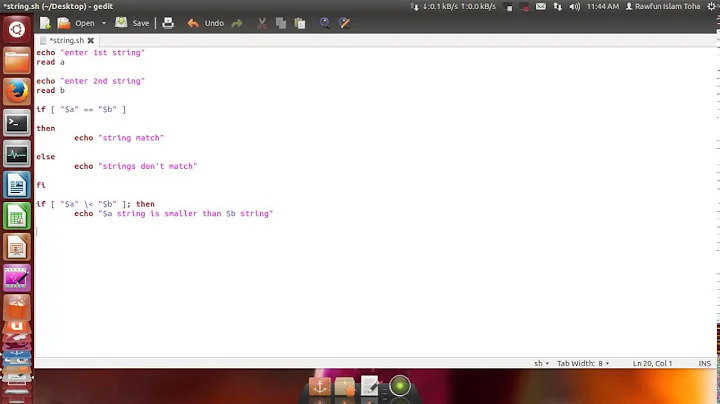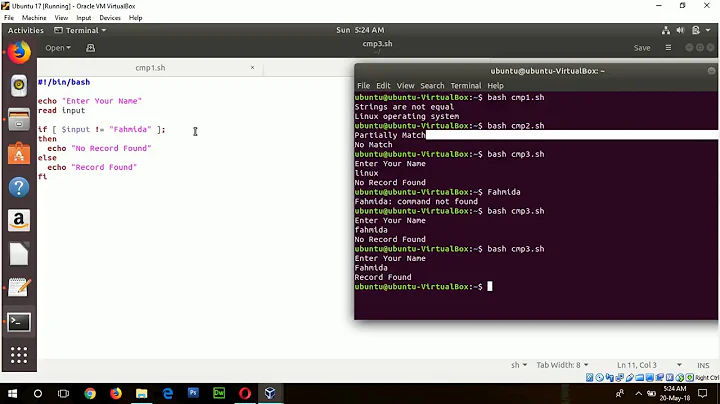Comparing two strings in Bash
Solution 1
-eq is an arithmetic operator, which compares two numbers.
Use = (portable/standard sh), =~ or == instead.
Also use quotes, because if ${PACKAGENAME} contains a whitespace or wildcard character, then it will be split into multiple arguments, which causes to make [ see more arguments than desired. See here a list of common bash pitfalls.
if [ "${PACKAGENAME}" = 'kakadu-v6_4-00902C' ]; then
echo "successfully entered if block!!"
fi
See man bash, search (/) for CONDITIONAL EXPRESSIONS.
Solution 2
Replace -eq with == so your if block would be this:-
if [ ${PACKAGENAME} == kakadu-v6_4-00902C ]; then
echo "successfully entered if block!!"
fi
Solution 3
Another way is to negate them:
: ${PACKAGENAME:?'$PACKAGENAME variable is empty!'} #emits error and exits
[ -z "${PACKAGENAME#kakadu-v6_4-00902C}" ] || { #if var - str not empty do block
echo '$PACKAGENAME is not kakadu-v6_4-00902C'
exit 1
} >&2
The above block first tests if "$PACKAGENAME" has any value at all, and, if not it exits with error and echoes ?'this'} to stderr. If its parent shell still exists then the test has passed, and it next tests if removing your 'kakadu...' string from the variable results in an -z empty string. If it does not, then it again emits an error and exits the shell. If your shell still exists at this point anything after the block is executed, otherwise it is not.
Probably this sort of thing is best implemented in a function. Like:
argeq() ( i= : ${2?^MERR: not enough parameters!} #$#>=2 || quit w/ err ^M == \r
z() { return $((${#1}>0)) ; } #return 1 if ${#1}>0 else 0
until z "${2+?}" $((i=i+1)) #until $2 is not set...
do ! z "$1" && z "${1#"$2"}" || #$1 != '' && $1 - $2 == '' or...
exit $((i${1:++1})) #exit $? == failed arg count
shift ; done #shift away one param ; continue loop
)
With that function you can provide as many arguments as your system will allow. If you provide fewer than 2 it will return 1 and emit a message to stderr. If you provide 2 or more arguments it will treat all as strings and return 0 if all are identical and not null else it will return the argument number which first fails the check.
In your case it can be used like:
{
PACKAGENAME='kakadu-v6_4-00902C'
argeq "$PACKAGENAME" kakadu-v6_4-00902C &&
echo "kakadu-v6_4-00902C == $PACKAGENAME" ||
echo failure
! argeq "${PACKAGENAME#*-}" kakadu-v6_4-00902C &&
echo "kakadu-v6_4-00902C != ${PACKAGENAME#*-}" ||
echo failure
}
###OUTPUT###
kakadu-v6_4-00902C == kakadu-v6_4-00902C
kakadu-v6_4-00902C != v6_4-00902C
To demonstrate further I'll write another function:
aeqecho() { i=$((i+1)) #inc for line#
argeq "$@" && echo "$i : yay" || #allswell or
! e=$? ${2+:} return || #save $?; ! exclusive || to drop ERRs
echo "$i : shite - arg$e failed" #report failure
}
DEMO:
{ i= s=string
aeqecho $s #1
aeqecho $s $s #2
aeqecho "$s $s" #3
aeqecho "$s $s" "${s} string" #4
aeqecho "${s}1" $s string #5
aeqecho "" "" "" #6
aeqecho "" "$s" $s #7
aeqecho 1 "${s#$s}1" $((2-1)) #8
aeqecho $s $s $s $s $s $s $s $s $s $s $s $s stng #9
aeqecho $s $s $s $s $s $s $s $s $s $s $s $s string #10
}
OUTPUT:
ERR: not enough parameters!
2 : yay
ERR: not enough parameters!
4 : yay
5 : shite - arg2 failed
6 : shite - arg1 failed
7 : shite - arg1 failed
8 : yay
9 : shite - arg13 failed
10 : yay
Related videos on Youtube
Comments
-
DemiSheep almost 2 years
I have the following
ifblock in my bash script:if [ ${PACKAGENAME} -eq kakadu-v6_4-00902C ]; then echo "successfully entered if block!!" fiThe script execution is not entering my
ifblock even though$PACKAGENAMEis equal tokakadu-v6_4-00902C. What am I doing wrong?-
jasonwryan almost 10 years
-eqis true for integers, you want to test for a string or regex (==or=~): mywiki.wooledge.org/BashGuide/TestsAndConditionals -
DemiSheep almost 10 yearsThanks
jasonwryanI'll take a look at this resource!
-
-
DemiSheep almost 10 yearsAh! Thank you! It worked! I am obviously a rookie at this. I'm grateful for your help!
-
 polym almost 10 yearsHave you had a look at tldp.org/LDP/Bash-Beginners-Guide/html ? It's a very nice bash guide and will help you with examples and exams :).
polym almost 10 yearsHave you had a look at tldp.org/LDP/Bash-Beginners-Guide/html ? It's a very nice bash guide and will help you with examples and exams :). -
 polym almost 10 yearsAlso have a look at the bash pitfalls link I've put into the updated answer. Happy coding :)!
polym almost 10 yearsAlso have a look at the bash pitfalls link I've put into the updated answer. Happy coding :)! -
 polym almost 10 yearsDon't forget quoting! Have a look here, why: mywiki.wooledge.org/BashPitfalls#A.5B_.24foo_.3D_.22bar.22_.5D
polym almost 10 yearsDon't forget quoting! Have a look here, why: mywiki.wooledge.org/BashPitfalls#A.5B_.24foo_.3D_.22bar.22_.5D -
Angel Todorov almost 10 yearsWithin double brackets, no word splitting is done, so
[[ $PACKAGENAME == "kakadu..." ]]is OK. -
 Gilles 'SO- stop being evil' almost 10 years@glennjackman Beware however that even within double brackets, you need double quotes around variable expansions on the right-hand side of
Gilles 'SO- stop being evil' almost 10 years@glennjackman Beware however that even within double brackets, you need double quotes around variable expansions on the right-hand side of=,==and!=, because that side is a pattern, not a string. For example,foo='*'; [[ whatever = $foo ]]is true. -
 beginer almost 10 years@polym hey thanks, but I just gave the minimalist version that was working ;) :D .
beginer almost 10 years@polym hey thanks, but I just gave the minimalist version that was working ;) :D . -
John B almost 10 yearsAlthough this is tagged with
bash, it's worth noting the test can be POSIX shell compliant by doing=as==is a Bashism.




